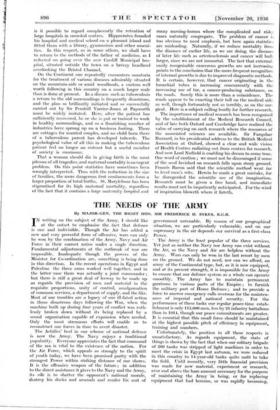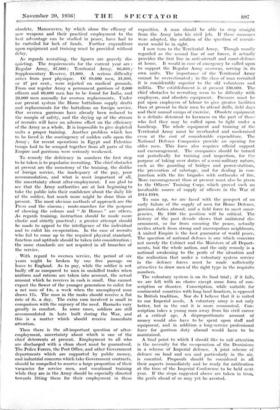THE NEEDS OF THE ARMY
By MAJOR-GEN. THE RIGHT HON. SIR FREDERICK H. SYKES, K.C.B.
IN writing on the subject of the Army, I should like at the outset to emphasise the fact that defence is one and indivisible. Though the Air has added a new and very powerful form of offensive, wars can only be won by the combination of the Army, Navy and Air Force in their correct ratios under a single direction. Fundamental adjustments at the outbreak of war are impossible. Inadequate though the powers of the .Minister for Co-ordination are, something is being done in this direction. In the recent operations in Egypt and Palestine the three arms worked well together, and in the latter case there was actually a joint commander ; but there is still a great deal of leeway to be made up as regards the provision of men and _ material in the requisite proportions, unity of control, amalgamation of common services, a department of supply, and the like. Most of our troubles are a legacy of our ill-fated action in those disastrous days following the War, when the machine built up during four years of conflict was ruth- lessly broken down without its being replaced by a sound organisation capable of expansion when needed. Only the most strenuous efforts will enable us to reconstruct our forces in time to avert disaster.
The Achilles' heel in our scheme of national defence is now the Army. The Navy enjoys a traditional popularity. Everyone appreciates the fact that command of the sea is vital to the existence of the nation. For the Air Force, which appeals so strongly to the spirit of youth today, we have been promised parity with the strongest Power within striking distance of our shores. It is the offensive weapon of the future ; in addition to the direct assistance it gives to the Navy and the Army, its rote is to shatter the opponent's national morale, destroy his docks and arsenals and render his 'seat of government untenable. By reason of our geographical situation, we are particularly vulnerable, and on our supremacy in the air depends our survival as a first-class Power.
The Army is the least popular of the three services. Yet just as neither the Navy nor Army can exist without the Air; so the Navy and Air are helpless without the Army. Wars can only be won in the last resort by men on the ground. We do not need, nor can we afford, an army of the Continental type, but, as it is now equipped, and at its present strength, it is impossible for the Army to ensure that our defence system as a whole can operate smoothly. The Army has to maintain permanent garrisons, in various parts of the Empire ; to furnish the military part of Home Defence ; and to provide a force to answer emergency calls overseas for the mainten- ance of imperial and national security. For the performance of these tasks our regular peace-time estab- lishment is only 115,000 men, less by 21 infantry battalions than in 1914, though our peace commitments are greater. It is essential that this small force should be 'maintained at the highest possible pitch of efficiency in equipment, training and numbers.
Unfortunately, the position in all these respects is unsatisfactory. As regards equipment, the state of things is shown by the fact that when our solitary brigade of 200 tanks was stripped of light machines in order to meet the crisis in Egypt last autumn, we were reduced in this country to 14-year-old tanks quite unfit to take the field. Until recently, very little financial provision was made for new material, experiment or research, over and above the bare amount necessary for the purpose of maintaining the Army in being, or for replacing equipment that had become, or was rapidly be-coming, obsolete. 1V.Ia.noeuvrcs,. by .which alone the efficacy of new weapons and their practical . employment to the best advantage can be studied in peace, have had to be curtailed for lack of funds. Further expenditure upon equipment and training must be provided without delay.
As regards recruiting, the figures are gravely dis- quieting. The requirements for the current year are : Regular Army,. 37,000 ; Territorial Army, 86,000 ; • Supplementary Reserve, 21,000. A serious difficulty arises from poor physique. Of 68,000 men, 31,000, or 47 per cent., were rejected on medical grounds. From our regular Army a permanent garrison of 3,000 officers and 60,000 men has to be found for India, and 20,000 men annually for oversea replacements. Under our present system the Home battalions supply . drafts and replacements for the battalions on foreign service. Our oversea garrisons have already been reduced to the margin of safety, and the drying up of the stream of recruits will have an adverse effect on the efficiency of the Army as a whole. It is impossible to give depleted units a proper training. Another problem which has to be faced is the contingency of sudden calls upon the Army ; for recent operations in Egypt and Palestine troops had to be scraped together from all parts of the Empire and garrisons were seriously weakened.
To remedy the deficiency in numbers the first step to be taken is to popularise recruiting. The chief obstacles at present are the monotony of the training, the dislike of foreign service, the inadequacy of the pay, poor accommodation, and what is most important of all, the uncertainty about after-employment. I am glad to see that the Army authorities are at last beginning to take the public into their confidence about the daily life of the soldier, but much more might be done than at present. The most obvious methods of approach are the Press and the cinema ; route-marches for the purpose of showing the colours and " At Homes " are others. As regards training, instruction should be made more elastic and strictly practical ; a greater attempt should be made to appeal to the intelligence of the individual and to enlist his co-operation. In the case of recruits who fail to come up to the required physical standard, function and aptitude should be taken into consideration ; the same standards are not required in all branches of the service.
. With regard to oversea service, the period of six years might be broken by one free passage on leave to England. As to pay, while the soldier is not badly off as compared to men in unskilled trades when uniform and rations are taken into account, the actual amount which he receives in cash is small. One cannot expect the flower of the younger generation to enlist for a net sum of 14s. a week when the unemployed man draws 17s. The man in the ranks should receive a flat rate of 8s. a day. The extra sum involved is small in comparison with the urgency of the need. Barracks vary greatly in comfort. In some cases, soldiers are still accommodated in huts built during the War, and this is a matter which should receive immediate attention.
Then there is the all-important question of after- employment, uncertainty about which is one of the chief -deterrents at present. Employment to all who are discharged with a clean sheet must be guaranteed. The Police Forces, the Post Office, and other Government departments which are supported by public money, and industrial concerns which take Government contracts, should be compelled to reserve a large proportion of their vacancies for service men, and vocational training while they are in the Army should be especially directed towards fitting them for their employment • in these capacities. A man should be able to step straight frOm the Army into his civil job. If these measures were adopted, the solution of the • question of recruit- ment would be in sight.
I now turn to the Territorial Army. Though usually regarded as the second line of our forces, it actually provides the first line in anti-aircraft and coast-defence at home. It would in case of emergency be called upon to support the Regular Army overseas, serving in its own units. The importance of the Territorial Army cannot be overestimated ; in the class of man recruited it is considerably superior to the old volunteers and militia. The establishment is at present 130,000. The chief obstacles to recruiting seem to be difficulty with employers, and obsolete equipment. Pressure must be put upon employers of labour to give greater facilities than at present to their men to attend drills, field days and their annual camps of exercise. Obsolete equipment.
is a definite deterrent to keenness on the part of those who feel they may be called upon to fight under a handicap. The whole equipment and training of the Territorial Army must be overhauled and modernised even at the cost of considerable expenditure. The National Defence Companies provide an opening for older men. This force also requires official support and encouragement. The companies should be turned out periodically for training and inspection, for the purpose of taking over duties of a semi-military nature, such as the guarding of bridges and power-stations, the prevention of sabotage, and for dealing in con- junction with the fire brigades with outbreaks of fire. More encouragement than at present must also be given to the Officers' Training Corps which proved such an invaluable source of supply of officers in the War of 1914-1918.
To sum up, we are faced with the prospect of an early failure of the supply of men for Home Defence, garrison duties abroad, and a field force to meet emer- gencies. • By 1938 the position will be critical. The history of the past decade shows that unilateral dis- armament, so far from ensuring the peace, actually invites attack from strong and unscrupulous neighbours. A united Empire is the best guarantor of world peace.
The question of national defence is one which concerns not merely the Cabinet and the Ministers of all Depart- ments, but the whole nation, and the only remedy is a national awakening to the perils of the situation and the realisation that under a voluntary system service in the defence forces must be made sufficiently attractive to draw men of the right type in the requisite numbers.
The voluntary system is on its final trial ; if it fails, we are left with no choice except some form of con- scription or disaster. Conscription, while suitable for continental countries with long land frontiers, is opposed to British tradition. Nor do I believe that it is suited to our Imperial needs. A voluntary army is not only better, but in the end it is more economical. Con- scription takes a young man away from his civil career at a critical age. A disproportionate amount of money would also have to be spent upon staff and equipment, and in addition a long-service professional force for garrison duty abroad would have to be maintained.
A final point to which I should like to call attention is the necessity for the co-operation of the Dominions in. a scheme .of Imperial defence. A joint scheme of defence on land and sea and particularly in the air, is essential. Proposals should be considered in all their aspects immediately and be ready for ratification at the time of the Imperial Conference to be held next year. If the steps suggested above are taken in time, the perils ahead of us may yet be averted.





























































 Previous page
Previous page